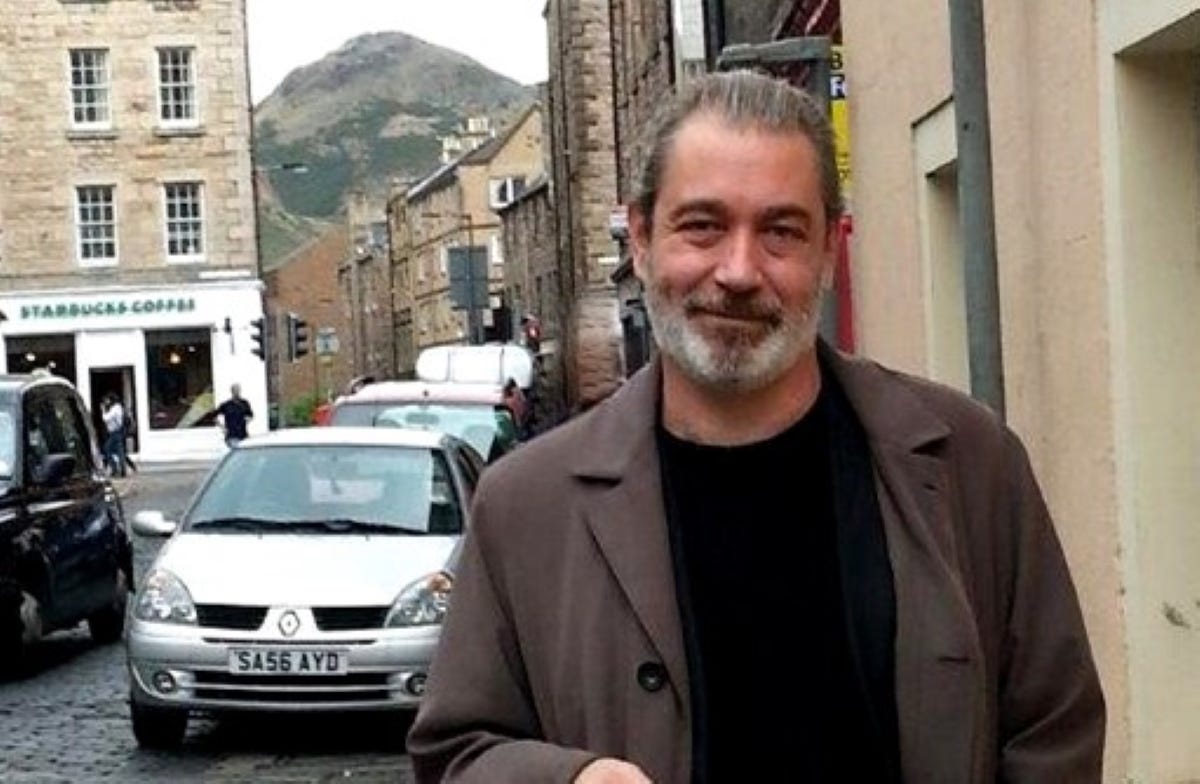|
 |
The American Author Living An Orwellian Nightmare
The plight of C.J. Hopkins isn’t just a tragic story—it should be a cautionary tale for anyone who values free speech
C.J. Hopkins has spent his career exposing Orwellian scenarios through his writing, only to find himself living one. A celebrated playwright, novelist and political satirist, the acclaimed American writer has lived in Berlin since 2004, becoming renowned for his sharp critiques of modern politics, government overreach and mass surveillance. His latest book, “The Rise of the New Normal Reich,” exposes the authoritarian drift in global politics, from pandemic-era lockdowns to the suppression of dissenting voices.
Now, somewhat cruelly, the city that once inspired his creativity has become the crucible of his persecution.
The sexagenarian’s troubles started innocuously enough: He posted a series of tweets in August 2022 criticizing COVID-19 mask mandates as “symbols of ideological conformity.” His comparison of modern Germany to the Nazi era ignited a firestorm, prompting an investigation by the Interior Ministry of the Federal State of Hessen, followed by a criminal probe by German authorities. What ensued was a relentless campaign to not only silence him but also to destroy his reputation, extending beyond Germany to Austria and the Netherlands.
His audacity to speak out resulted in book bans, a criminal trial and a media frenzy. Despite his initial acquittal, the Berlin district prosecutor, dissatisfied with the verdict, has appealed the decision. This has resulted in a retrial, which began this week before the Berlin-Schöneberg Chamber of Commerce.
Many Americans might view Hopkins’ story as a peculiarly German or European example of persecution—and prosecution—of free speech, but Hopkins himself counters this notion. “My case,” he insists, “is just one of countless examples of the criminalization of dissent that is being rolled out worldwide. My story isn’t about the difference between German and American free speech protections. It is about the German authorities prosecuting government critics like me on blatantly fabricated charges.” He warns that “once a government starts doing that, the protections in its constitution no longer matter. You’re no longer dealing with questions of law. You are dealing with the exercise of authoritarian power.”
Like other satirists, Hopkins is a gadfly who often espouses what many might consider unorthodox ideas. For instance, he contends that his experiences are indicative of a larger, global shift—a movement toward a more authoritarian or totalitarian form of global capitalism since 2016. This transition, he argues, affects various regions around the world, including the EU, the U.S., Russia and, of course, China.
Hopkins believes that this transition has been ongoing since the early 1990s. According to him, “it’s one big global-capitalist world now, and most of us don’t really get that yet.” He emphasizes that global capitalism, having no external adversaries and no external checks, is no longer compelled to simulate democracy as it did during the Cold War to placate the Western masses. In essence, Hopkins suggests that because global capitalism faces no outside competition, it has allowed authoritarianism to gain ground.
Hopkins also characterizes the situation as one where the primary objective of governments is to execute a “clear-and-hold” operation, which involves forcibly removing those deemed apostates. This approach, he cautions, is becoming increasingly overt, with his own situation serving as a prominent example of this broader pattern.
Whether all of this is true or not, it is hard not to feel concern that Hopkins may be going to prison for expressing these and other beliefs.
The word “dystopian” is often tossed around carelessly, like confetti at a parade. Yet the details of Hopkins’ upcoming trial truly portray a dystopian reality. Full-scale anti-terrorism security protocols have been ordered. Attendees will undergo TSA-style scanning and screening, surrender all personal possessions for inspection, and face restrictions on electronic devices. The courtroom gallery, limited to 35 members of the press and public, will be heavily monitored by armed security personnel.
Hopkins is not a member of Al Qaeda. In reality, he is an aging, affable writer who is being treated like a threat simply for sharing his artistic flair. The American describes the pretext for these measures as absurd. He believes that they are being enacted “to suppress the kind of press coverage my first trial got and discourage the public from attending.”
Does any part of him miss home? The answer is yes. Hopkins, who is still deeply connected to his Miami roots, often reflects on his past. He acknowledges, “I miss the USA all the time—parts of it anyway. I’ve lived in Europe for 20 years, but I remain very much an American at heart." However, he quickly adds, “I can’t see how I could ever move back. I couldn’t afford to. I’ve lived a stereotypical artist’s life, just scraping by financially, and often not even that.” He laments, “The U.S. is no place to be old and poor. There is still enough social support in Germany and most other European countries for an author like me to maintain a relatively decent standard of living, or at least avoid ending up sleeping under an overpass.” If the German government wins in court, though, he might find himself sleeping on a concrete slab in a prison cell.
Although Hopkins does not really expect to receive a prison sentence, the ordeal has been both psychologically and financially draining. He observes, “This has been going on for over a year now and shows no signs of ending anytime soon. I’m hanging in there. Good days and bad days.” He may not be a prisoner—at least not yet—but he is treated like a criminal. Specifically, as a “thought criminal” who spends many hours in and out of legal briefings.
Whether in Boston or Berlin, legal representation doesn’t come cheap. So how does he manage to pay the bills? Hopkins credits his loyal fanbase for their support. “My readers,” he explains, “donated enough to my legal defense fund to get me this far when the prosecution began. I am extremely grateful to them for that. Unfortunately, if I’m right about what will happen in Superior Court, a long series of appeals might be ahead. I’ll deal with that if and when it comes. I’m taking all this one step at a time.”
Rather tragically, the man who once cherished Berlin now feels disillusioned and dejected about being there. He likens his experience to that of a jilted lover betrayed by a city that, not that long ago, promised so much inspiration. A once-warm embrace has turned into a painful punch to the solar plexus. Berlin has become Beijing.
But while he’s dazed, he's not defeated. Down, but not completely out. However, if the German authorities have their way, he may eventually find himself wiped out by the mental turmoil and never-ending legal fees. It could turn out to be a death by a thousand cuts, one that leaves him drained and deeply in debt.
Hopkins’ story extends beyond personal tragedy; it serves as a cautionary tale. His persecution by the German government highlights a global trend toward the criminalization of dissent and the erosion of free speech. As he remarks, “This is happening throughout the West, not just in Germany. The criminalization of dissent is a global story.” And indeed, the plight of C.J. Hopkins should spark global outrage.
You’re currently a free subscriber to Discourse .

